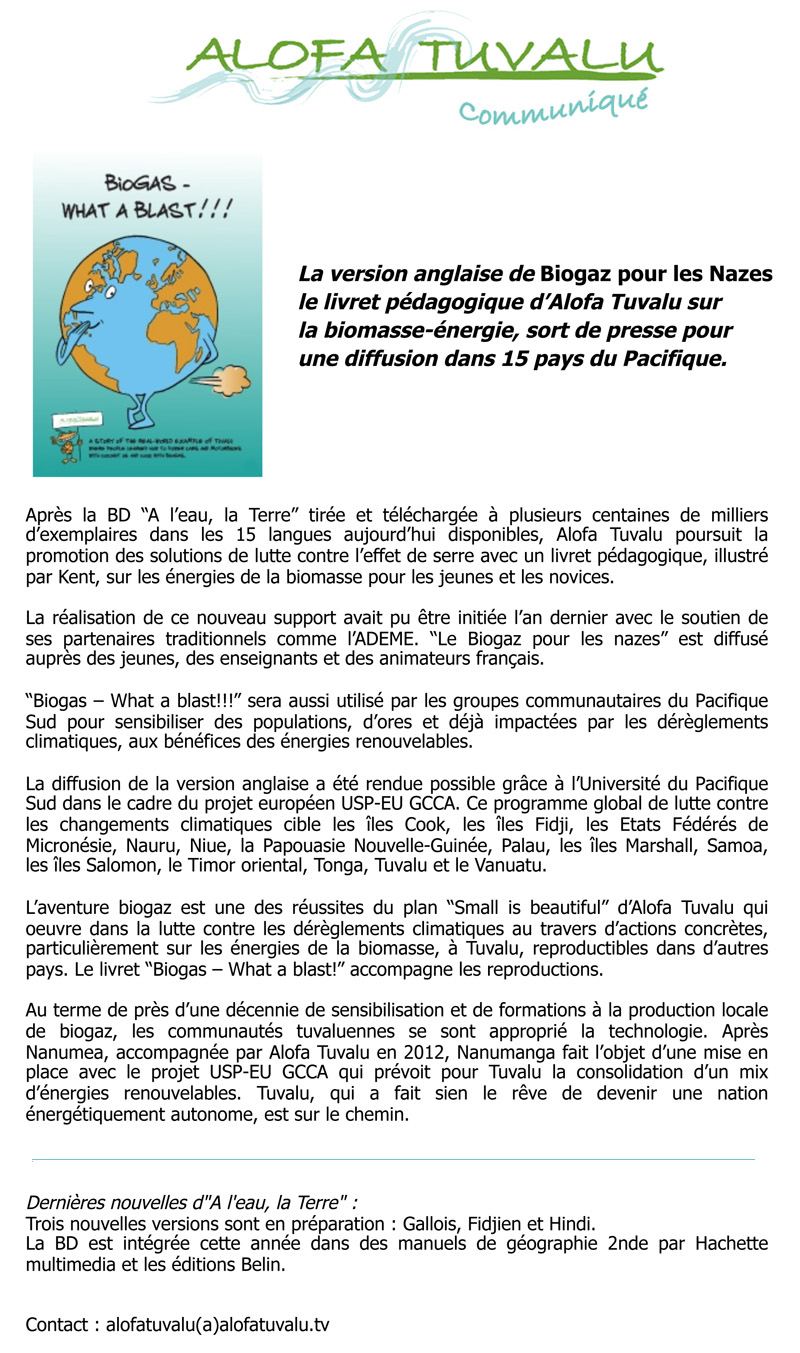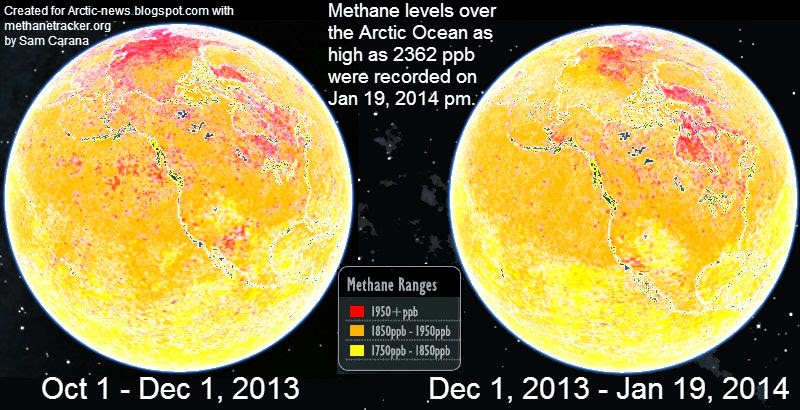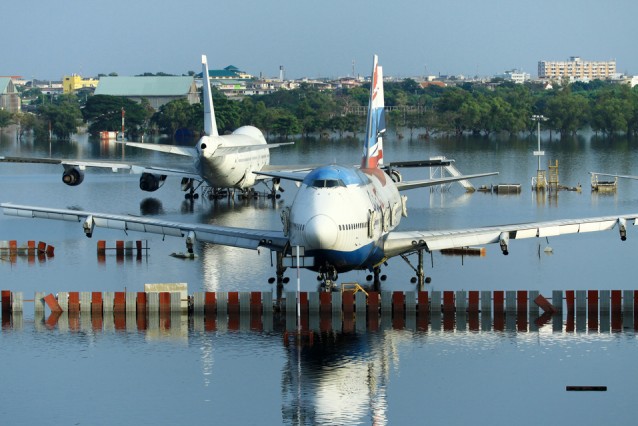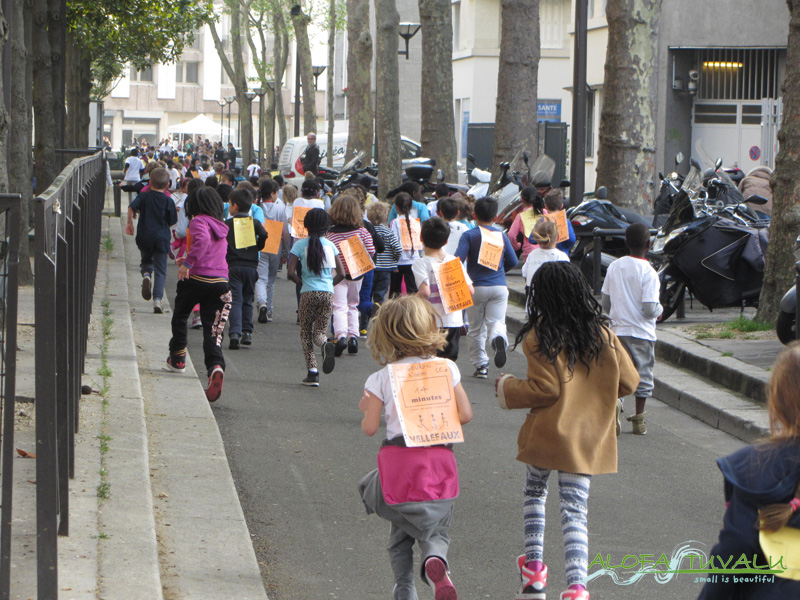
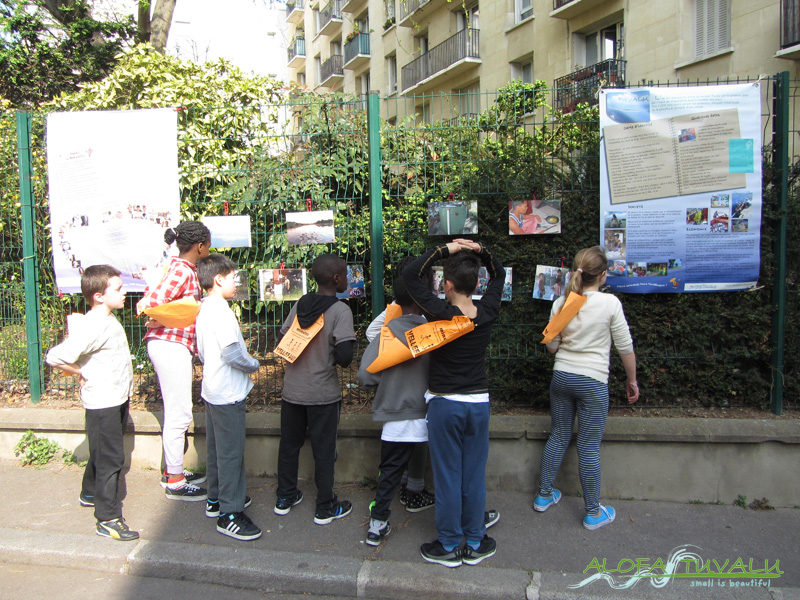
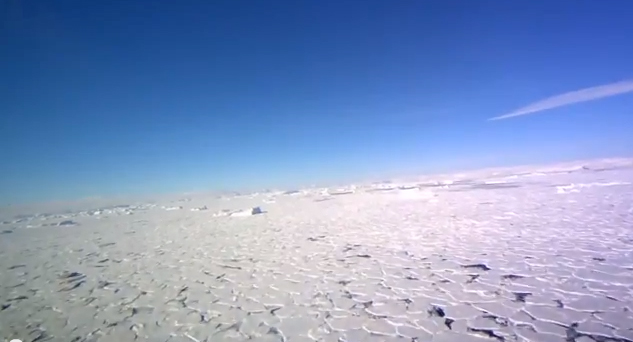
"The length of the melt season for Arctic sea ice is growing by several days each decade, and an earlier start to the melt season is allowing the Arctic Ocean to absorb enough additional solar radiation in some places to melt as much as four feet of the Arctic ice cap's thickness, according to a new study by National Snow and Ice Data Center (NSIDC) and NASA researchers."
https://www.youtube.com/watch?v=7IQBn-Sg-gc
Remember 2009? : www.youtube.com/watch?v=uHxnJyYtO18
Cat
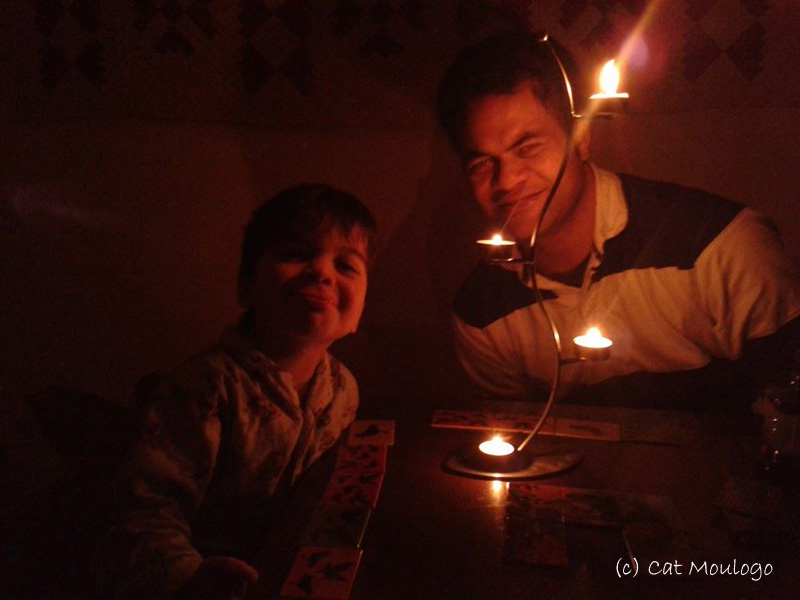

ILLUSTRATIONS SONORES "Cest le titre de lexposition qui aura lieu aux 3 Baudets du 6 mars au 10 avril prochains. Pourquoi ce titre ? Parce que ma vie durant jai dessiné la musique. Pochettes, affiches, illustrations diverses, travail de commande ou crobards dilettantes, lexposition en réunit un bon nombre, des 70s à aujourdhui." Kent
6 mars 2014 : vernissage de l'expo
10 mars 2014 : concert
10 avril 2014 : concert
Plus d'infos sur le site des trois baudets
Et retrouvez Kent sur Facebook
Pourtant le lien avec les changements climatiques n'est (presque) jamais fait par nos dirigeants...
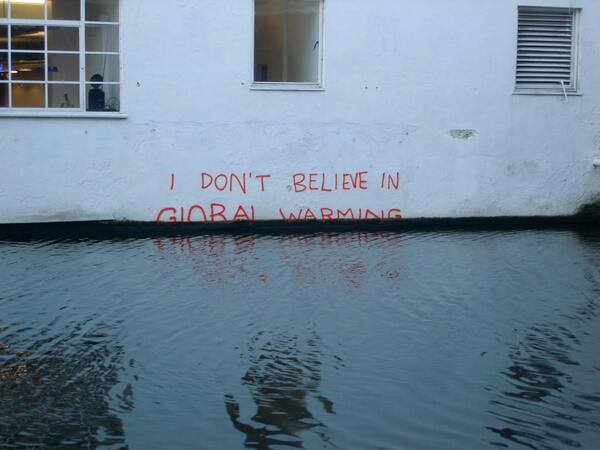
Retrouvez le Réseau Action Climat sur Facebook
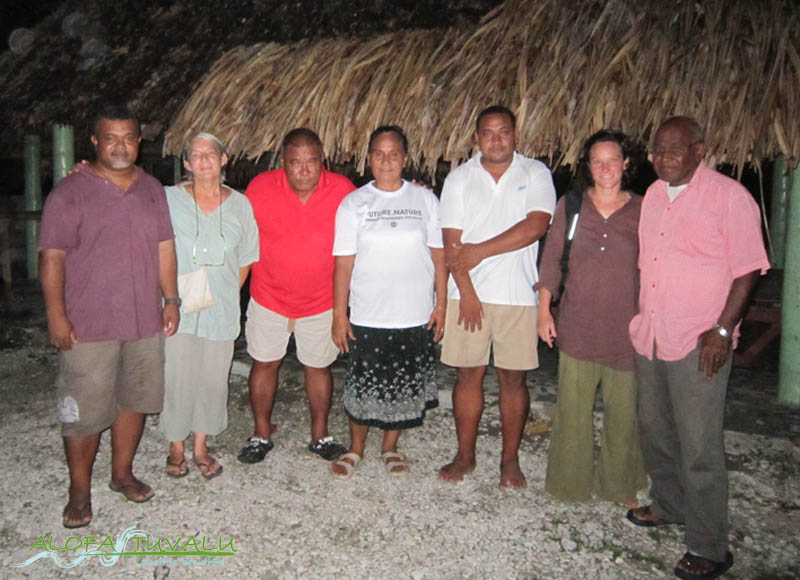
(from left to right: Leota, Gilliane, Iefata and wife, Sailoto, Fanny, Sikeli)
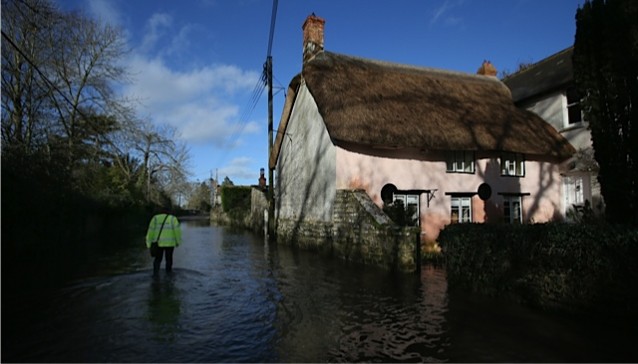
Credit: AP Images
ACCESS THE ARTICLE
On February 5, our friend Gill, teacher at Ringwood School in the Uk (Hampshire) wrote :
"Today, as has occurred throughout December and January half of England is flooded. We understand Tuvalus plight. All the best"
Mid February, no improvement !...
I dont think Ive ever seen anything quite like last night.
The call to organize rallies against Keystone XL went out on Friday afternoon as the State Department released their report on the pipeline. By Monday morning, over 250 actions were planned and thousands of people were ready to take to the streets in the cold, rain and snow.
In New York, people gathered after a heavy snow and spelled out a giant #noKXL message in lights. In DC, a crowd stood outside the White House and asked a simple question to President Obama: "Will you be a climate champion or the pipeline president? In Nebraska, folks gathered in the solar-powered barn that stands in the path of the pipeline were it to move forward.
I could say more, but in this case it really is true that the pictures are worth a thousand words. Could you share this image with photos from last night on Facebook to help show the world that this movement is mobilized like never before?
Click here to share this image:
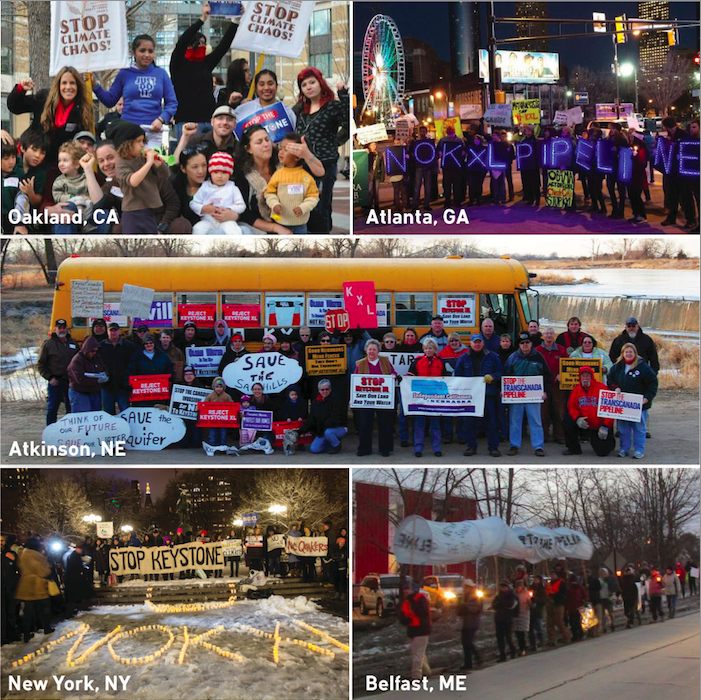
(Photo credits: Oakland - Brooke Anderson, Atkinson - Diane Steskal, NYC - Terry Allen)
If thats what we can do in one weekend, imagine what were capable of in the weeks and months to come, as President Obama makes his final decision about the pipeline.
Tonight well be bringing together a video chat to talk about some ideas for what comes next. Now is the time to start making plans the video chat will start at 9 PM Eastern/ 6 Pacific, and well have a message from 350.org co-founder Bill McKibben, hear from Idle No More organizer Clayton Thomas-Muller, and lay out some ideas for a full court-press to stop the pipeline.
Click here to get a reminder email for the video chat: act.350.org/sign/feis-video-chat/
President Obama has the evidence he needs to reject the pipeline the question is whether he wants to be remembered as a climate champion or the pipeline president.
That means that Washington bureaucrats wont decide this fight we will. If we can make enough noise in enough creative, unavoidable ways, we can drown out the voice of big oil.
This wont be our last fight there are still many tar sands projects to stop, and a whole fossil fuel economy to turn around but it is a crucial one, and one that Im so, so excited to continue alongside you.
Lets do this.
Duncan
350.org is building a global movement to solve the climate crisis. Connect with us on Facebook and Twitter, and sign up for email alerts. You can help power our work by making a donation.
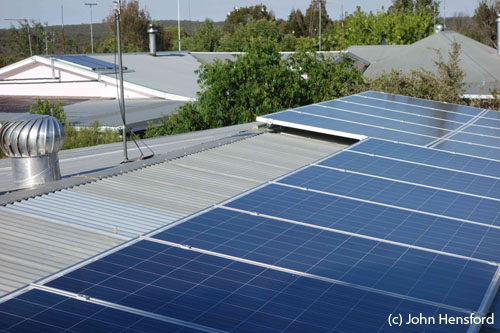
![]() John said:
John said:
I cant remember whether I mentioned or not that I had installed a grid-connected solar power system. The opportunity came up unexpectedly to make an arrangement with a small power company to sell them my excess power at 30 cents/kWh, compared to 34.2 cents buying from them. I installed a 5kW system (20 panels). I would like to have gone bigger but that was all that the power company permitted (they want one to draw some power from them).
They will supposedly install a new meter soon that shows power production and power consumption and offsets one against the other. For time being I still have my old meter; it spins backwards when the sun is shining. Thrilling to see that! Yesterday my net consumption was minus 8kWh. My running average daily consumption for two months was 0.6kWh but having family here at Xmas and using air-conditioning on one rather hot night, and doing lots of cooking, suddenly pushed up the daily average to 2.3kWh. Nevertheless, that is far lower than before. I calculate that I have saved $925 in the three months since installation. Payback would take about four years on present figures but will be longer taking into account the lower angles of sunlight and shorter days in Winter.
We made the decision to install the panels flat on the roof of our shed which is only sloped at 20 degrees to horizontal. It would be better to have them at about 35 degrees but that would have required a more expensive supporting framework. The increased efficiency would probably not have justified the extra cost. Anyway, it was not an option as the installers didnt have the materials for such a frame. More importantly, my wife said I absolutely dont want ugly panels sticking up in the air. So that was that!
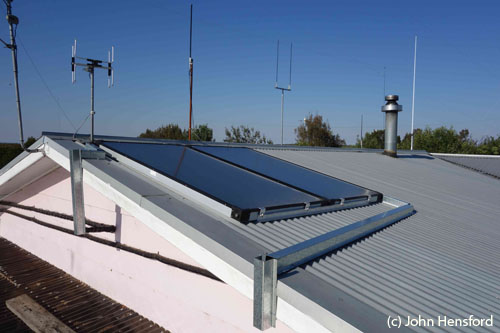
I also installed a solar hot water system. After looking at the various options, including heat pump and evacuated tube systems, I went for a conventional solar panel system but with the tank at ground level (connected to the panels through a heat exchanger).
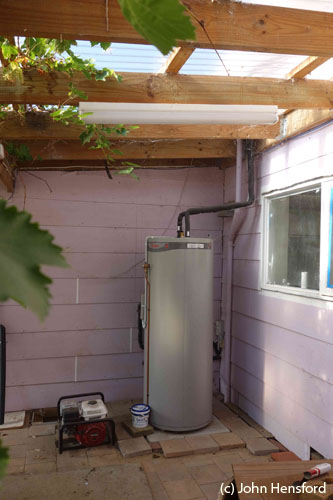 The tank has a booster element connected to our existing off-peak power supply. In three months weve used 43kWh of off-peak power at 20 cents/kWh but most of that was consumed on Xmas and Boxing Days when the house was full of kids showering. When just my wife and I are at home the off-peak meter hardly changes from one week to the next. The payback time will be at least nine years, so its not really an economic proposition in our situation where off-peak power is available but, what the heck, I did it anyway!
The tank has a booster element connected to our existing off-peak power supply. In three months weve used 43kWh of off-peak power at 20 cents/kWh but most of that was consumed on Xmas and Boxing Days when the house was full of kids showering. When just my wife and I are at home the off-peak meter hardly changes from one week to the next. The payback time will be at least nine years, so its not really an economic proposition in our situation where off-peak power is available but, what the heck, I did it anyway!
I have in mind to install more solar panels. I wont be able to connect them to grid because of the power companys policies but I will be able to use the power in other ways to reduce overall consumption. I dont want to use batteries because standalone solar systems are so expensive. What I have in mind is to use direct loading. Our waterbed is a significant consumer of power (I have been measuring it) even though I recently installed a new, supposedly more efficient heater. The consumption isnt really a concern at present because I have at time clock on the heater circuit that only allows power during full daylight hours. Nevertheless, if I can connect panels directly to the heater it will allow more power to go to the grid during the day, bringing our production close to equalling what we draw from the grid at night.
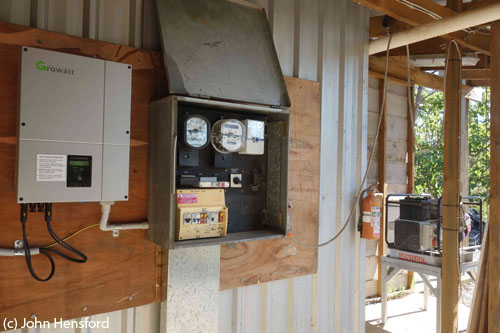
Matching the panels and the load is not straightforward. I want to understand it all better so I have decided to take advantage of a living with solar course offered by the Rainbow Power Company (www.rpc.com.au) in a few weeks. That company has its business at Nimbin in northern NSW, an area that has a plethora of alternative living people (hippies as they used to be called when that term was in vogue). It should be an interesting course.
![]() Alofa Tuvalu counterpart in the US and an architect specialized in environment, Chris said: So great that you have embraced solar at home. Yeah...with all its own ins and outs, it can be a pain at first to adjust...but longer term, it's the right, smart move...and it sounds like you are rapidly becoming an expert, as you always do with things that capture your attention. Funny about the longer payback on the hot water system...it's just the opposite here in California. Payback is MUCH quicker for hot water...especially with new state subsidy. But there are so many variables from place to place... In any case...way to go! Will be interested in hearing of your continuing solar adventures. When are you converting to an electric car ??? (sorta just joking re that one... your distances are likely too great.... but maybe an electric scooter?)
Alofa Tuvalu counterpart in the US and an architect specialized in environment, Chris said: So great that you have embraced solar at home. Yeah...with all its own ins and outs, it can be a pain at first to adjust...but longer term, it's the right, smart move...and it sounds like you are rapidly becoming an expert, as you always do with things that capture your attention. Funny about the longer payback on the hot water system...it's just the opposite here in California. Payback is MUCH quicker for hot water...especially with new state subsidy. But there are so many variables from place to place... In any case...way to go! Will be interested in hearing of your continuing solar adventures. When are you converting to an electric car ??? (sorta just joking re that one... your distances are likely too great.... but maybe an electric scooter?)
![]() John said: I must admit I didnt directly take into account the subsidies available for solar systems. They were taken off the prices that I had to pay for the two systems. My payback calculations were on net price basis as thats what mattered most to me. Still, I think that is a correct way of calculating, or have I missed something?
John said: I must admit I didnt directly take into account the subsidies available for solar systems. They were taken off the prices that I had to pay for the two systems. My payback calculations were on net price basis as thats what mattered most to me. Still, I think that is a correct way of calculating, or have I missed something?
With solar hot water the calculation would no doubt be very different if there were more people living in my house. We could have installed a more modest system that would have met our requirements 95% of the time. That would have paid back much more quickly I suppose.
Offpeak power here is about 60% the cost of peak power so is quite an economical way of heating water. My average cost was about $1.49 per day. Now its virtually nothing, but it takes a long time to recoup capital cost at $1.49 per day!
Something I am watching carefully is use of air-conditioning. My Xmas scare wasnt so bad as I thought. My wife has just told me that the grandkids switched on a heat lamp in the main bathroom and left it on all night. They flipped the wrong switch - heap lamp instead of light. Its a good thing I didnt find out at the time; I might have been a little upset! Anyway, it was good in the sense that it has made me very wary of using air-conditioning. As you know, we ceased using any air-conditioning in Tuvalu last year, which made a huge reduction in consumption. Here in southern Australia theres not the same need for air-conditioning anyway, and in addition our houses are much better insulated that Tuvaluan houses. Admittedly it is Summer now and if we get the very high temperatures that some parts of Australia are experiencing I may have to concede a little cooling. However, yesterday it was 36.5C here and I didnt feel the need for aircon. Perhaps thats a legacy of having lived in the tropics so long! Its also a question of humidity. Its low here and feels much cooler than the average day in Tuvalu, despite being about five degrees hotter here than the average in Tuvalu.
Electric car? Huh, if I went to the local shops I would need to plug in and recharge before I could come home! Electric scooter? Possible I think, but not much fun riding one our dusty, unsealed roads around here.
![]() Chris said: If you calculated on a "net price paid", including any subsidy, then that would seem an accurate way to do it. When calculating economics of solar projects, it's important to include the value of any subsidy that is available...as it can completely affect the viability of any given project. Germany and Spain built their entire solar industries in this fashion, offering the equivalent of enormous subsidies by paying way over the market price of conventional power to solar/alt energy producers feeding power into the grid...so called "feed-in tariffs". This caused some problems later when fit's were lowered later, but the ones in early -- at both personal and commercial scale -- made out very well. And this is how Germany, with its many grey days, became the #1 installed solar power producer in the world...!!
Chris said: If you calculated on a "net price paid", including any subsidy, then that would seem an accurate way to do it. When calculating economics of solar projects, it's important to include the value of any subsidy that is available...as it can completely affect the viability of any given project. Germany and Spain built their entire solar industries in this fashion, offering the equivalent of enormous subsidies by paying way over the market price of conventional power to solar/alt energy producers feeding power into the grid...so called "feed-in tariffs". This caused some problems later when fit's were lowered later, but the ones in early -- at both personal and commercial scale -- made out very well. And this is how Germany, with its many grey days, became the #1 installed solar power producer in the world...!!
everything you describe re your house is part of what i call "the solar learning curve"...learning how to adapt one's habits to an entirely new way of energy production and management. there are just a bunch of new details to learn to maximize system efficiency. when designing a new house, for example, from the ground up, some of these have nothing at all to do with equipment but rather with actual design....the kinds of materials used, the orientation of the building, where windows are placed, where and what kind of landscaping is used to provide shade where needed, etc, etc. This latter category is known as "passive design"...all the things you can do WITHOUT active solar systems to maximize energy efficiency and living comfort. Intelligence with passive measures can radically reduce the need for the more costly active ones... Example: roof overhangs designed to utilize season sun-angles to shade windows in summer when sun is high, but to allow sun in in winter to help heat house. etc etc etc....there are hundreds of such "tricks" to work WITH nature and site specifics....
one point of interest to me: designing this way is both VERY MODERN in terms of learning how to best maximize efficiency and reduce footprint....but in many ways also ANCIENT in terms of working with nature, something which successful societies have done since time began!
re the electric car idea....sounds premature for your situation, but eventually there will be effective enough storage and longer available ranges to take advantage of all the electricity you are producing...
it all sounds like great fun for you...a kind of living experiment as you make the big transition...and, over the longer haul, save a good deal of $$ while you're at it !! all best.
A confession: I hesitated to even send this email.
The thing Im writing about today -- a trade agreement called the Trans-Pacific Partnership, or TPP -- is a bit outside 350.org's wheelhouse. When it came down to it though, I couldnt NOT send this email, since the TPP is shaping up to be the worst kind of corporate power grab.
This week, Wikileaks released newly leaked documents that confirm the worst: the United States' TPP negotiating team is walking away from supporting strong environmental safeguards. Without protections for land use, logging, and climate pollution, the TPP has gone from a bad deal to a disastrous one. It's time to take action:
Click here to tell your Members of Congress to reject the Trans-Pacific Partnership.
The TPP is an expansive, highly secretive international free trade agreement. It's being negotiated by delegates from twelve Pacific Rim countries, including the United States, along with hundreds of industry leaders. Elected officials, civil society, and the press have largely been shut out of negotiations, but these leaked documents reveal disturbing provisions.
The TPP would empower corporations to directly sue governments over laws and policies that they claim reduce their profits. Legislation designed to address climate change, curb fossil fuel expansion, and reduce air pollution could all be subject to attack as a result of the TPP.
Right now, our best chance to stop this train wreck is to stop Congress from giving fast-track authority to President Obama, allowing him to push the agreement through without a public debate.
Click here to tell your Congressional representatives to reject fast track and the Trans-Pacific Partnership.
In Australia, New Zealand, Peru, Malaysia, Vietnam, Singapore, and here in the U.S., citizens have taken to the streets in mass protest. Last year, 130 members of Congress voiced concerns about the TPP, and opposition is growing now that a fast-track bill has been introduced in the Senate. Let's make sure those Senators and Representaives who may be on the fence get our message loud and clear:
We oppose the "fast-track" bill, and we reject the TPP.
Any trade agreement that gives corporations unfettered power is a bad one, but a trade agreement like this would be a disaster for people and the planet.
Onward,
Phil
350.org is building a global movement to solve the climate crisis. Connect with us on facebook and Twitter.

2013 is coming to a close, the 10th year since our first trip to Tuvalu and our uninterrupted campaigns to fight Climate Change*.
In November 2013, as the planet hit a record heat, over 40 years since the Stockhom meeting and first reports, the 19th CoP took place in Poland (see our CoP15 video)
To divertingly illustrate what international happenings feel like i.e.: hot air we chose to recycle our biogas leaflet cover (thanks to our friend Kent).
For 2014, our planetary wish is for all leaders to get serious And, for all and each of you, well stay on the entertaining field with John Lennons All we need is love and wish you : love, care, share humanity.
The Alofa Tuvalu Paris office
*below is a one page overview of what 2013 was made of for us.
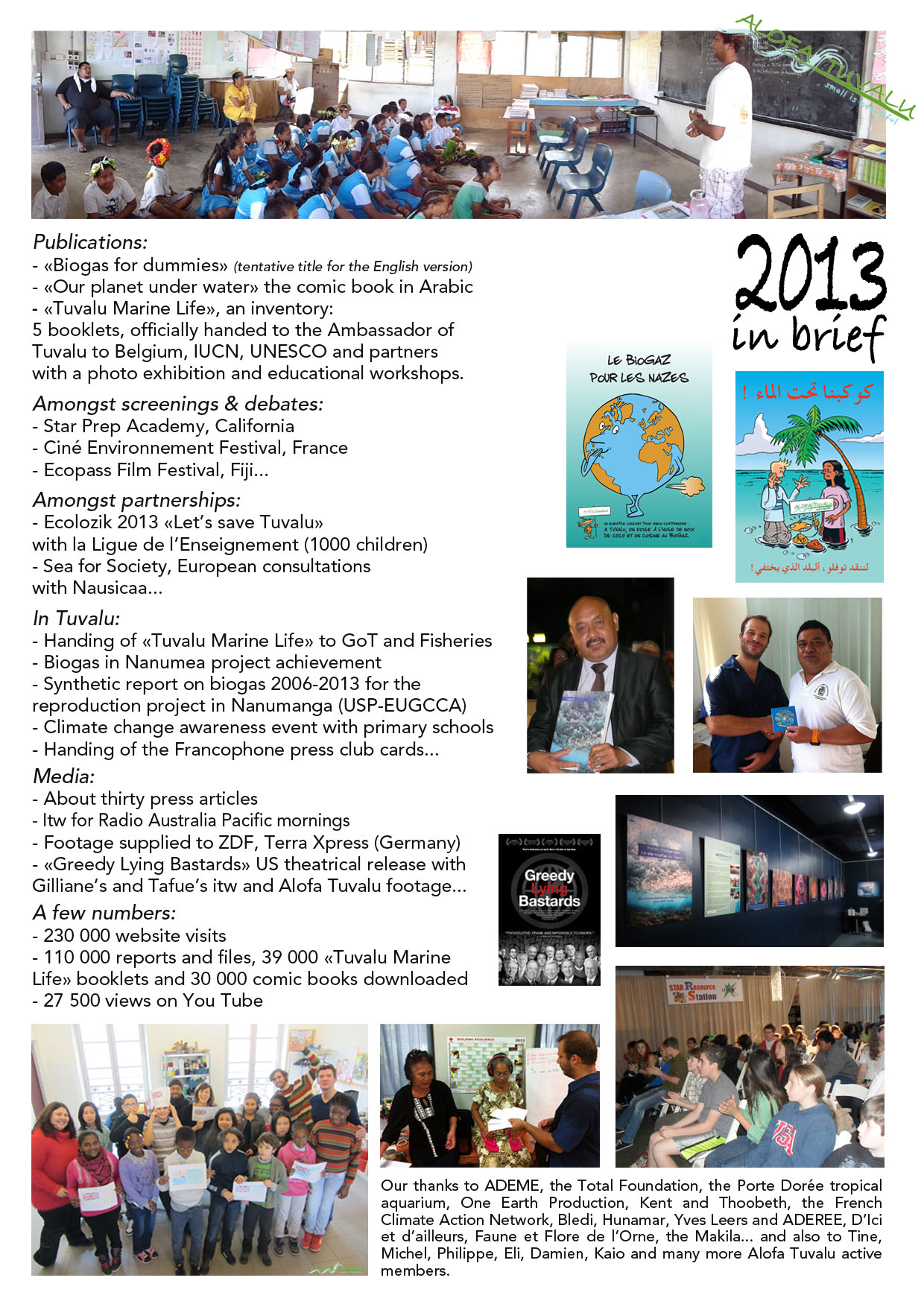

2013 sachève, la 10ème année depuis notre premier voyage à Tuvalu et nos campagnes ininterrompues depuis contre les changements climatiques*.
Au mois de novembre, le plus chaud jamais enregistré, plus de 40 ans après la conférence de Stockholm et les premiers rapports, la CoP19, le rendez-vous annuel international sur le climat, se déroulait en Pologne. (Voir notre vidéo sur la CoP15))
Pour illustrer ce quévoquent ces grands raouts, nous avons choisi, pour nos voeux 2014, en clin doeil, de recycler la couverture de notre livret sur le biogaz (merci Kent !).
Un souhait global : que les dirigeants de la planète fassent preuve dun peu de sérieux
Et pour tous et chacun de vous, restons sur le terrain du divertissement avec le all we need is love de John Lennon et un voeu : amour, partage et humanité.
Le bureau parisien dAlofa Tuvalu
*ci-dessous un aperçu de nos activités 2013
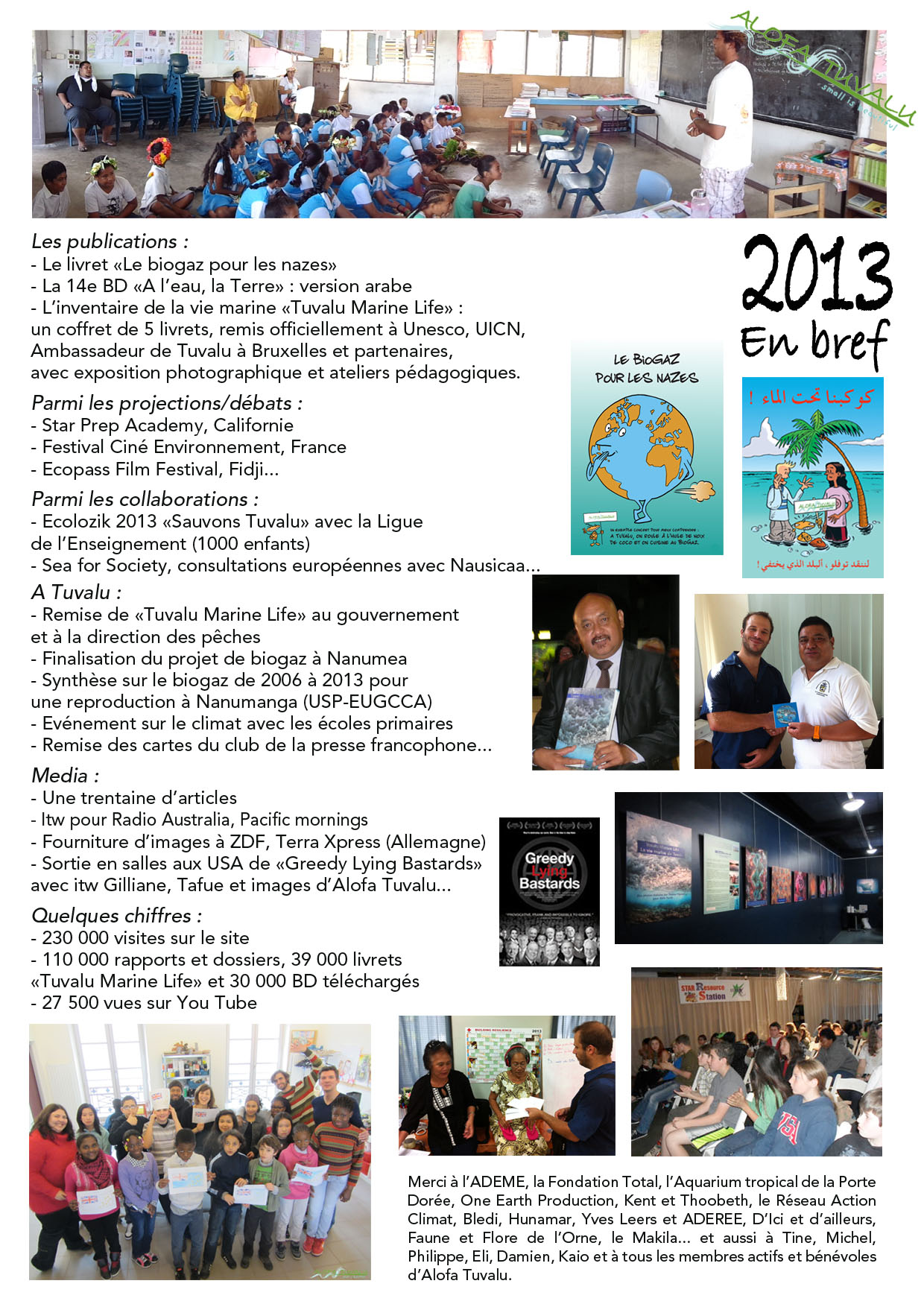
On Thursday November 21 2013, Unions and international NGOs decided to leave the COP19 negociations. The objective : to protest, in solidarity with the victims of Climate Change facing the steps backward of gathered countries in Warsaw : (Japan climbing down, Australian crises, firing of the Polish Environment Minister replaced with a pro shale gas) and to send a strong message : enough is enough ! Alofa Tuvalu, as part of the Board of the Climate Action Network France (RAC), is very proud of this strong demonstration of our common deep disappointment,
Gilliane
Warsaw Climate Conference of the Parties : ENOUGH !
The NGOs joint statement:
Organizations and movements representing people from every corner of the Earth have decided that the best use of our time is to voluntarily withdraw from the Warsaw climate talks. Instead, we are now focusing on mobilizing people to push our governments to take leadership for serious climate action.
We have said we stand in solidarity with the millions impacted by Typhoon Haiyan, and with all climate impacted people. Our solidarity compels us to tell the truth about COP 19 the Warsaw Climate Conference.
In fact, the actions of many rich countries here in Warsaw are directly undermining the UNFCCC itself, which is an important multilateral process that must succeed if we are to fix the global climate crisis.
The Warsaw Conference started off on the wrong foot, with a Coal & Climate Summit being held in conjunction, corporate sponsorship from big polluters plastered all over the venue, and a Presidency that is beholden to the coal and fracking industry. Things only got worse during the first week, when Japan announced that it was following Canada and backtracking on mitigation commitments previously made, and Australia gave multiple signals that it was utterly unwilling to take the UN climate process seriously.
This week saw a finance ministerial with almost no actual finance, and loss and damage talks that have stalled because rich countries refuse to engage on substance. Warsaw has not seen any increase in emission reductions or support for adaptation before 2020 and on many of these things it has actually taken us backward. And a clear pathway to a comprehensive and fair agreement in Paris 2015 is missing.
We as civil society are ready to engage with ministers and delegations who actually come to negotiate in good faith. But at the Warsaw Conference, developed country governments have come with nothing to offer. Developing country governments are also failing to stand up for the needs and rights of their people. Australian Prime Minister Tony Abbott posted a video to mark the opening of the 44th parliament, saying the adults are back in charge, as he seeks to abolish the carbon tax.
It is clear that if countries continue acting in this way, the next two days of negotiations will not deliver the climate action the world so desperately needs.
Therefore, organizations and movements representing people from every corner of the Earth have decided that the best use of our time is not to further engage in the Warsaw climate talks. Instead, we are now going back to mobilize people to push our governments to take leadership for serious climate action. We will work to transform our food and energy systems at a national and global level and rebuild a broken economic system to create a sustainable and low-carbon economy with decent jobs and livelihoods for all. And we will put pressure on everyone to do more.
Coming out of the Warsaw Climate Conference, it is clear that without such pressure, our governments cannot be trusted to do what the world needs. We will return with the voice of the people in Lima to hold our governments accountable to the vision of a sustainable and just future.
Précédent Suivant
